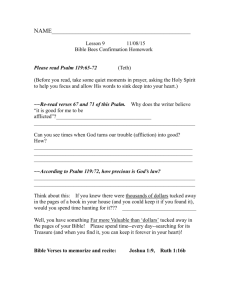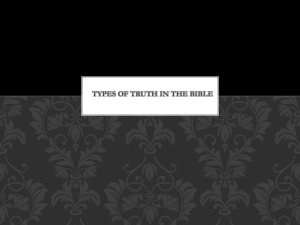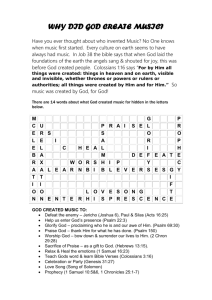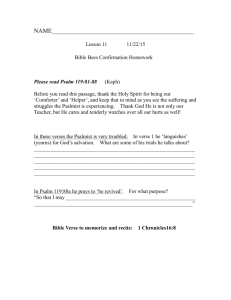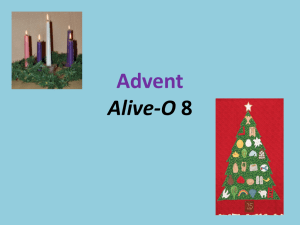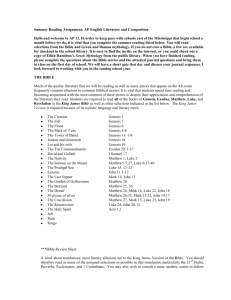Starting to read the Bible Session 2
advertisement
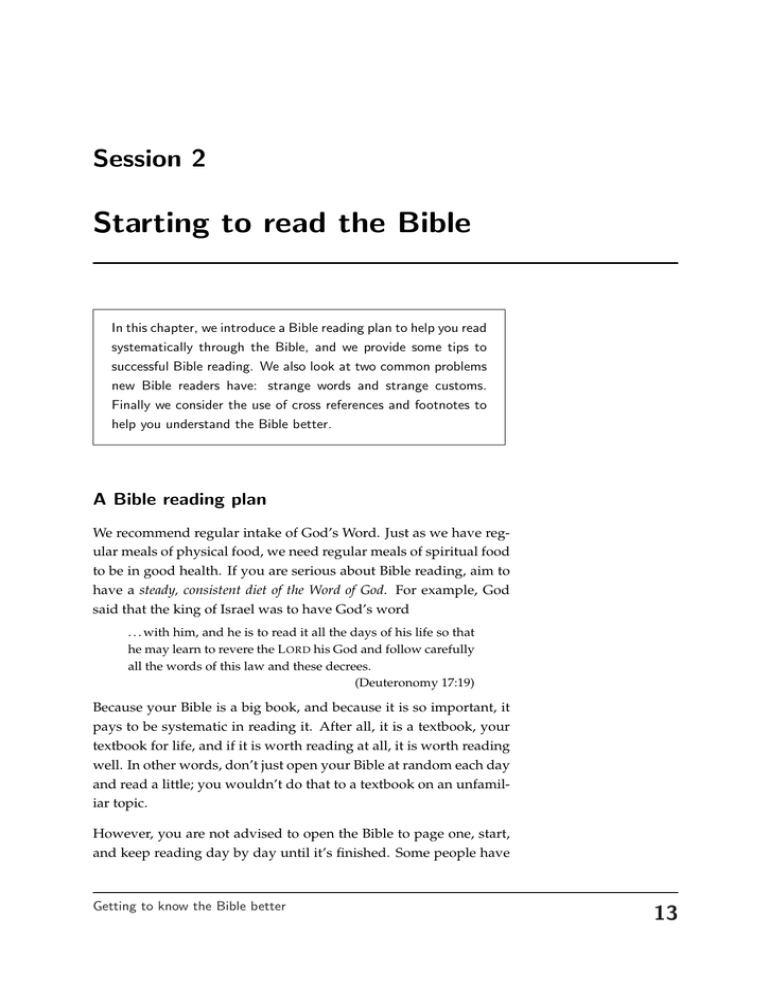
Session 2 Starting to read the Bible In this chapter, we introduce a Bible reading plan to help you read systematically through the Bible, and we provide some tips to successful Bible reading. We also look at two common problems new Bible readers have: strange words and strange customs. Finally we consider the use of cross references and footnotes to help you understand the Bible better. A Bible reading plan We recommend regular intake of God’s Word. Just as we have regular meals of physical food, we need regular meals of spiritual food to be in good health. If you are serious about Bible reading, aim to have a steady, consistent diet of the Word of God. For example, God said that the king of Israel was to have God’s word . . . with him, and he is to read it all the days of his life so that he may learn to revere the L ORD his God and follow carefully all the words of this law and these decrees. (Deuteronomy 17:19) Because your Bible is a big book, and because it is so important, it pays to be systematic in reading it. After all, it is a textbook, your textbook for life, and if it is worth reading at all, it is worth reading well. In other words, don’t just open your Bible at random each day and read a little; you wouldn’t do that to a textbook on an unfamiliar topic. However, you are not advised to open the Bible to page one, start, and keep reading day by day until it’s finished. Some people have Getting to know the Bible better 13 Session 2. Starting to read the Bible successfully read the Bible that way. But some of the difficulties experienced by people when they first read the Bible lead us to recommend a step by step approach which gives important and useful ideas quite early in your reading, and then progressively builds on them. There are several ways of achieving this, but we have chosen a reading course that has been widely used and well tested. The reading planner we are using (see page 15) gives daily readings for one year, each day’s reading consisting of one chapter. Through the year, you will read from many different parts of the Bible. We will also provide an accompanying booklet which will help fill you in on some of that Bible background you may need as you read each chapter. If you keep up your Bible readings for a year, you will cover many different parts of the Bible and develop a good grasp of the overall plan of God. Preparing to read the Bible There are a number of things that need to be considered when reading the Bible. 1. Pray It is important to ask God’s blessing on your reading. It is his book and he can help us understand it. 2. Be comfortable To properly concentrate on the Bible, you will need to find a comfortable, quiet place in which to read. Try to avoid places where there is a lot of background noise from the television or other people talking. In the Bible, God speaks to us. It is worth listening carefully. 3. Allow time Bible reading is most effective if you are not rushed. Set aside 20–30 minutes each day to read the passage and think about what it means. It also takes time to become familiar with the Bible message and the background in which it is set. Be patient, and over time it will all start to fit together like a beautiful jigsaw. Getting to know the Bible better 14 Session 2. Starting to read the Bible Week 1 2 3 4 5 6 7 8 9 10 11 12 13 14 15 16 17 18 19 20 21 22 23 24 25 26 27 28 29 30 31 32 33 34 35 36 37 38 39 40 41 42 43 44 45 46 47 48 49 50 51 52 Sunday Psalm 19 Genesis 2 Matthew 1 Genesis 11 Matthew 8 Genesis 22 Matthew 15 Genesis 32 Matthew 22 Genesis 43 Mark 1 Exodus 1 Mark 10 Exodus 8 Luke 1 Exodus 16 Luke 11 Lev 8 Luke 18 Num 14 John 1 Deut 1 Acts 1 Joshua 1 Acts 8 Judges 4 Acts 15 1 Samuel 1 Acts 22 1 Samuel 16 Romans 5 1 Kings 3 1 Corinth 1 Psalm 1 2 Corinth 11 Psalm 32 Ephesians 4 Psalm 67 1 Thess 1 Psalm 103 1 Timothy 1 Isaiah 1 Hebrews 1 Isaiah 40 Hebrews 12 Jeremiah 1 1 Peter 1 Ezekiel 2 1 John 1 Daniel 2 Hosea 13 Rev 1 Monday Genesis 1 Genesis 3 Matthew 2 Genesis 12 Matthew 9 Genesis 26 Matthew 16 Genesis 33 Matthew 23 Genesis 44 Mark 2 Exodus 2 Mark 11 Exodus 9 Luke 2 Exodus 17 Luke 12 Lev 10 Luke 19 Num 17 John 3 Deut 2 Acts 2 Joshua 2 Acts 9 Judges 7 Acts 16 1 Samuel 2 Acts 23 1 Samuel 17 Romans 6 1 Kings 5 1 Corinth 2 Psalm 2 Galatians 1 Psalm 37 Ephesians 5 Psalm 72 1 Thess 2 Psalm 104 1 Timothy 2 Isaiah 2 Hebrews 2 Isaiah 42 Hebrews 13 Jeremiah 17 1 Peter 2 Ezekiel 3 1 John 2 Daniel 3 Joel 3 Rev 2 Tuesday Luke 2 Genesis 4 Matthew 3 Genesis 13 Matthew 10 Genesis 27 Matthew 17 Genesis 37 Matthew 24 Genesis 45 Mark 3 Exodus 3 Mark 12 Exodus 10 Luke 4 Exodus 19 Luke 13 Lev 16 Luke 20 Num 20 John 4 Deut 3 Acts 3 Joshua 3 Acts 10 Judges 14 Acts 17 1 Samuel 3 Acts 24 2 Samuel 1 Romans 8 1 Kings 12 1 Corinth 3 Psalm 6 Galatians 2 Psalm 45 Ephesians 6 Psalm 88 1 Thess 3 Psalm 110 1 Timothy 6 Isaiah 9 Hebrews 3 Isaiah 52 James 1 Jeremiah 30 1 Peter 3 Ezekiel 18 1 John 3 Daniel 5 Micah 5 Rev 3 Wednesday 1 Corinth 13 Genesis 5 Matthew 4 Genesis 14 Matthew 11 Genesis 28 Matthew 18 Genesis 39 Matthew 25 Genesis 46 Mark 6 Exodus 4 Mark 13 Exodus 11 Luke 5 Exodus 20 Luke 14 Lev 17 Luke 21 Num 21 John 10 Deut 6 Acts 4 Joshua 4 Acts 11 Ruth 1 Acts 18 1 Samuel 8 Acts 25 2 Samuel 2 Romans 9 1 Kings 17 1 Corinth 10 Psalm 16 Galatians 3 Psalm 46 Philip 1 Psalm 90 1 Thess 4 Psalm 122 2 Timothy 1 Isaiah 11 Hebrews 4 Isaiah 53 James 2 Jeremiah 31 1 Peter 5 Ezekiel 36 1 John 4 Daniel 6 Zec 8 Rev 5 Thursday Mark 4 Genesis 6 Matthew 5 Genesis 15 Matthew 12 Genesis 29 Matthew 19 Genesis 40 Matthew 26 Genesis 47 Mark 7 Exodus 5 Mark 14 Exodus 12 Luke 7 Exodus 24 Luke 15 Lev 23 Luke 22 Num 22 John 11 Deut 8 Acts 5 Joshua 6 Acts 12 Ruth 2 Acts 19 1 Samuel 9 Acts 26 2 Samuel 5 Romans 10 1 Kings 18 1 Corinth 11 Psalm 19 Galatians 4 Psalm 48 Philip 2 Psalm 91 1 Thess 5 Psalm 146 2 Timothy 2 Isaiah 25 Hebrews 5 Isaiah 55 James 3 Jeremiah 33 2 Peter 1 Ezekiel 37 2 John Daniel 7 Zec 12 Rev 19 Friday Eccles 3 Genesis 7 Matthew 6 Genesis 17 Matthew 13 Genesis 30 Matthew 20 Genesis 41 Matthew 27 Genesis 49 Mark 8 Exodus 6 Mark 15 Exodus 13 Luke 9 Exodus 25 Luke 16 Lev 25 Luke 23 Num 23 John 15 Deut 18 Acts 6 Joshua 20 Acts 13 Ruth 3 Acts 20 1 Samuel 10 Acts 27 2 Samuel 7 Romans 12 2 Kings 5 1 Corinth 13 Psalm 22 Galatians 5 Psalm 49 Philip 3 Psalm 95 2 Thess 1 Psalm 149 2 Timothy 3 Isaiah 26 Hebrews 10 Isaiah 60 James 4 Jeremiah 36 2 Peter 2 Ezekiel 38 3 John Daniel 9 Malachi 3 Rev 21 Saturday 2 Timothy 3 Genesis 8 Matthew 7 Genesis 19 Matthew 14 Genesis 31 Matthew 21 Genesis 42 Matthew 28 Genesis 50 Mark 9 Exodus 7 Mark 16 Exodus 14 Luke 10 Exodus 32 Luke 17 Lev 26 Luke 24 Num 24 John 17 Deut 28 Acts 7 Joshua 24 Acts 14 Ruth 4 Acts 21 1 Samuel 15 Acts 28 2 Samuel 24 Romans 13 2 Chron 36 1 Corinth 15 Psalm 23 Galatians 6 Psalm 51 Philip 4 Psalm 96 2 Thess 2 Psalm 150 2 Timothy 4 Isaiah 32 Hebrews 11 Isaiah 61 James 5 Jeremiah 38 2 Peter 3 Ezekiel 39 Jude Daniel 12 Malachi 4 Rev 22 Table 2.1: Table of readings from the Bible Reading Planner. Getting to know the Bible better 15 Session 2. Starting to read the Bible 4. Be open to new ideas If we are to gain as much as we can from Bible reading, we need to approach the Bible with the right attitude. The people from Berea (in Greece) are described as being of more noble character than the Thessalonians, for they received the message with great eagerness and examined the Scriptures every day to see if what Paul said was true. (Acts 17:11) We need an openness to new ideas. If we approach all ideas thinking that our main job is to defend our existing beliefs, then we have very little room for growth. The Bible is a book of strength that has withstood all kinds of attacks during its history. As in all other areas of study, scholars build upon and re-evaluate the work of earlier scholars. We need not fear examining new ideas and evaluating them carefully in the light of all the teachings of the Bible. 5. Think about it God told Joshua Do not let this Book of the Law depart from your mouth; meditate on it day and night, so that you may be careful to do everything written in it. Then you will be prosperous and successful. (Joshua 1:8) To successfully understand the message of the Bible, we must spend time thinking about it carefully. So important is this that God said to the nation of Israel: Fix these words of mine in your hearts and minds; tie them as symbols on your hands and bind them on your foreheads. Teach them to your children, talking about them when you sit at home and when you walk along the road, when you lie down and when you get up. Write them on the doorframes of your houses and on your gates, so that your days and the days of your children may be many in the land that the L ORD swore to give your forefathers, as many as the days that the heavens are above the earth. (Deuteronomy 11:18–21) 6. Ask questions You will inevitably have questions about what you read. Write them down. You might discover the answers through further reading. Or you can take your questions to a more experienced Bible reader to see if he or she can help. Bring your Getting to know the Bible better 16 Session 2. Starting to read the Bible questions along to this course and see if anyone can answer them. 7. Share your ideas We need an attitude of willingness to meditate on what we are learning and to think through for ourselves how our learning should be applied in our own lives. To do this, it is usually helpful to share our ideas and interpretations with other Bible students for discussion and evaluation. We can learn from each other. Bible study can be difficult work. It is also exciting and lifechanging. Study of the Bible can enrich us as no other study can. You will experience a new energy as you learn to make your own judgements based on firm principles, and the Bible will become more alive and powerful in your life. Remember, you are intended to understand this remarkable book and to meet God in its pages. Psalm 19 Let’s start using the Bible Reading Planner by reading Psalm 19. 1. According to this Psalm, what two things speak to us about God? 2. What different words are used to describe God’s instructions? 3. Are there any words, or verses, that you don’t understand? 4. What questions do you have after reading this Psalm? 5. What verse do you find particularly helpful to you? Why? Getting to know the Bible better 17 Session 2. Starting to read the Bible Strange language The King James Version (or KJV, also called the Authorised Version) is the most quoted version of the Bible. It was produced in 1611 and is famous for its majestic language. However, these days it is becoming increasingly difficult to understand because of changes in the English language. Consider the following passage (Psalm 23:1–3). The L ORD is my shepherd; I shall not want. He maketh me to lie down in green pastures: he leadeth me beside the still waters. He restoreth my soul: he leadeth me in the paths of righteousness for his name’s sake. Compare the New International Version (NIV): The L ORD is my shepherd; I shall not be in want. He makes me lie down in green pastures, he leads me beside quiet waters, he restores my soul. He guides me in paths of righteousness for his name’s sake. Note the archaic form of verbs used in the KJV. Notice, also, that punctuation has changed—the colon (:) is used differently today. However, in this passage, none of the words in the KJV is particularly difficult to understand and the meaning of the passage is clear. This is not true everywhere. The KJV can sometimes be difficult to understand because of the archaic language. Consider the following two examples. Psalm 119:147–148 KJV NIV 147 I prevented the dawning of the morning, and cried: I hoped in thy word. 147 148 148 Mine eyes prevent the night watches, that I might meditate in thy word. I rise before dawn and cry for help; I have put my hope in your word. My eyes stay open through the watches of the night, that I may meditate on your promises. What does the word “prevent” mean in the KJV? Getting to know the Bible better 18 Session 2. Starting to read the Bible “Conversation” Read Philippians 1:27 in the KJV. Turn to a more recent version for comparison. What does the word “conversation” mean in the KJV? As these two examples show, some words have a different meaning now from the meaning they had in 1611 when the KJV first appeared. In fact, it contains over 500 words which have changed their meaning or become obsolete. Some are shown in the table below. Language is dynamic—it is always changing. New words are created, old words die out, some words change their meaning. Therefore, if you wish to read an older version such as the KJV, you need to learn the old words. Even with a modern version, you will come across words that are not in common use. There are things mentioned in the Bible which are not part of everyday conversation, and so the words used may not be familiar. When you come across these words, check the definitions listed in The Bible Readers’ Handbook. Some archaic words from the King James Version Old word Modern equivalent Example prevent ..................................... 1 Thessalonians 4:15 bowels ..................................... Genesis 43:30 bewitch ..................................... Acts 8:9 allow ..................................... Luke 11:48 conversation ..................................... Philippians 1:27 bruit ..................................... Jeremiah 10:22 maketh collops ..................................... Job 15:27 trow ..................................... Luke 17:9 Getting to know the Bible better 19 Session 2. Starting to read the Bible Strange customs The people in the Bible lived thousands of years ago in a different culture and a different land. When reading the Bible, you will soon learn some of their ancient customs. For example: When David arrived at the summit, where people used to worship God, Hushai the Arkite was there to meet him, his robe torn and dust on his head. (2 Samuel 15:32) Tearing your clothes and covering your head with dust seems strange behaviour to us, but in the context it is clear that this was a sign of mourning. The same custom is found many times throughout the Old Testament. It doesn’t take long to recognize most of these ancient customs and learn what they meant. What was the purpose of these ancient customs? • tearing your clothes • putting dust on your head • wearing sackcloth and sitting in ashes • professional wailing women • walls around cities • sitting in the gate of a city • giving someone your sandal Do you know any other ancient customs mentioned in the Bible? Getting to know the Bible better 20 Session 2. Starting to read the Bible Footnotes Footnotes are provided by the translators to explain some words, give alternative translations, or explain some aspect of the text. They are often helpful in understanding a passage. Consider the example below from the Revised Standard Version. Matthew 5:21–22 Consider the following passage from Matthew 5:21–22 which is part of Jesus’ famous “Sermon on the mount”. This excerpt is from the RSV. The basic message of Jesus is quite clear: “in the past you were told not to kill—I am telling you not even to be angry or abusive.” He was taking the Old Testament commandment to a new level. However, we can understand the passage better using the footnotes. The small letters i, j and k after the words “brother”, “insults” and “hell” indicate there is a footnote with more explanation. The first one shows that some of the ancient manuscripts of the New Testament give a slightly different form of words, which alters the meaning. Obviously the translators felt the form of words they used in the main text was the most likely but there was sufficient doubt to include the alternative as a footnote. The second footnote explains that the original Greek actually refers to a particular abusive expression. Because this has little meaning for us, they have translated it. The third footnote shows that the word “hell” has been used for the Greek word Gehenna. Gehenna was a valley south of Jerusalem; it is also known as the valley of Hinnom. It was used as a rubbish dump and always had a fire burning to destroy the rubbish. Previously it had been the site of child sacrifice to an Ammonite god called Molech (Jeremiah 32:35). Jesus uses it as a symbol of complete destruction. Getting to know the Bible better 21 Session 2. Starting to read the Bible Most footnotes are for the following purposes: • • • • • source of quotations explanation of textual variations meaning of non-English words gives Hebrew or Greek word alternative translations Cross-references There is no better commentary on the Bible than the Bible itself. No source is more appropriate for interpreting God’s Word than God himself. It is in this area that the use of cross-references can be so valuable. They are verse ‘references’ supplied by the publishers which direct the reader to other locations in the Bible where the same phrase or event may be found, or one very similar. Example: Matthew 5:21–22 The following example from the NIV Study Bible shows the use of both footnotes and crossreferences. The bold superscripts are footnotes. The italic superscripts are for cross-references (given to the side of the text). Look up the following cross-references. Exodus 20:13; Deuteronomy 5:17; 1 John 3:15; Ephesians 4:26; James 1:19–20. Do they help us better understand what Jesus said? Getting to know the Bible better 22 Session 2. Starting to read the Bible Not all Bibles have cross-references. Bibles which do have crossreferences will usually place them in a centre column, after the footnotes, or at the end of each verse. Most cross-references take one of the following forms: 1. Quotations of the Old Testament in the New Testament, or vice versa; 2. Parallel passage of the same or similar events; 3. More detail about a person, place or subject. Further reading ä Bible beginnings by Richard Purkis and Ian Doveton. ä On reading the Bible by A.D. Norris. Ask the presenter if you wish to borrow a copy of either of these books. Getting to know the Bible better 23 Session 2. Starting to read the Bible Exercise: Genesis 1 The second reading in the Bible Reading Planner is Genesis 1. Read the chapter and discuss the following questions. 1. Were the sun, moon and stars created before or after the earth? 2. How could there be “evening and morning” before the sun was created? 3. What food was assigned to man? There is a cross-reference to Genesis 9:3. What does this tell us? 4. Over what part of creation did man have dominion? How does this affect our care for the environment? 5. Human beings are described as being created “in God’s image”. Look at the following cross-references: Ephesians 4:24; Colossians 3:10; James 3:9. How do these help us understand what Genesis means? 6. Are there any words, or verses, that you don’t understand? 7. What questions do you have after reading this chapter? 8. What verse do you find particularly helpful to you? Why? Getting to know the Bible better 24 Session 2. Starting to read the Bible Homework 1. Follow the Bible Reading Planner every day this week. 2. Start a notebook with questions that arise when you read your Bible. Then you can discuss your questions with the class next week. 3. Read tonight’s reading (Luke 2). Several words are used that you may not have come across before. Find out what they mean. (Hint: some of the words are listed in the The Bible Readers’ Handbook.) ä Saviour ä Christ ä manger ä circumcise ä Law of Moses ä Holy Spirit ä Gentiles ä Passover 4. Here are some examples of cross references. Use them to answer the questions. (a) Luke 9:7–9 Why was John the Baptist beheaded? Cross reference to Matthew 14:1–11; Mark 6:14–18. (b) Matthew 12:38–42 Who was the “Queen of the South”? Cross reference to 1 Kings 10:1. Getting to know the Bible better 25
